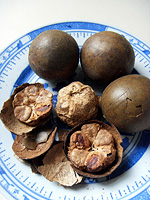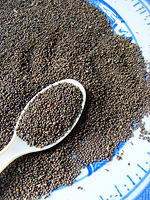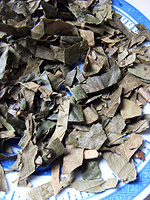Many people develop a cough with abrupt changes of climate. The cough can be dry and impossible to suppress, or be so phlegm-filled that it makes your chest hurt and disturbs sleep. Many over-the-counter (OTC) medications are therefore designed for cough relief.
In traditional Chinese medicine (TCM), coughing is not only regarded as a symptom of a respiratory disease, but also an independent syndrome in itself. TCM uses an unique theory to understand how cough develops, and has created abundant prescriptions to treat various types of cough.
Many proprietary Chinese medicines are available on the market. In comparison with western cough medicines, Chinese OTC products provide a gentle way of relieving a cough and are less likely to have side effects. Since they are herbal mixtures, the multiple components can get to the root of the problem in repairing damage and resuming correct function comprehensively. Read the labels carefully and choose a product that most fits your particular cough, so as to get the maximum benefit out of these herbal products.
 Arhat fruit Arhat fruit |
 perilla fruit perilla fruit |
 loquat leaf loquat leaf |
| TCM Cough type |
Wind-cold type cough |
| Indications |
Coughing with thin and white phlegm, nasal congestion, runny nose, sneezing, chills and headache |
| TCM approaches for relief |
Disperse wind and coldness, disseminate lung-qi and arrest coughing |
| Common used ingredients |
Folium Perillae
Semen Armeniacae Amarum
Radix Platycodi
Herba Ephedrae
Pericarpium Citri Reticulatae
Radix Glycyrrhizae |
| Sample products |
Unblock and Disseminate Pill to Regulate the Lungs (tong xian li fei wan)
Apricot and Perilla Cough Syrup (xing su zhi ke tang jiang)
Minor Blue Dragon Granules (xiao qing long ke li)
Apricot, Perilla, Citrus and Pinellia Pill (xing su er chen wan)
Cassia Twig and Fossil Bone Stopping Cough and Wheeze Capsule (gui long ke chuan ning jiao nang) |
| TCM Cough type |
Wind-heat type cough |
| Indications |
Coughing with thick and yellow phlegm, throat soreness, thirst, yellow nasal discharges, fever and headache. |
| TCM approaches for relief |
Disperse wind, clear heat, resolve phlegm and arrest coughing |
| Common used ingredients |
Bulbus Fritillariae Cirrhosae
Folium Eriobotryae
Radix Platycodi
Radix Peucedani
Fructus Momordicae
Cortex Mori Radicis
Snake gallbladder
Bamboo juice |
| Sample products |
Fritillary Bulb Clear Lung Syrup (chuan bei qing fei tang jiang)
Fritillary Bulb and Loquat Leaf Syrup (chuan bei pi pa lu)
Snake Gallbladder and Fritillary Bulb Oral Solution (she danchuan bei yi)
Arhat Fruit Cough Granules (luo han huo zhi ke ke li)
Stop-Cough Loquat Leaf Granules (zhi ke pi pa chong ji)
Bamboo Juice Oral Solution (xian zhu li yi) |
| TCM Cough type |
Wind-dry type cough |
| Indications |
Dry coughing, or cough up blood stained phlegm, itchy and dry throat, mouth dryness, chest pain and chapped lips |
| TCM approaches for relief |
Clear and moisten the lungs, resolve phlegm and arrest coughing |
| Common used ingredients |
Pear
Lily bulb
Loquat leaf
Bulbus Fritillariae Cirrhosae
Pericarpium Citri Reticulatae
Radix Peucedani
Radix Ophiopogonis |
| Sample products |
Pear Extract (xue li gao)
Fritillary Bulb and Pear Syrup (chuan bei xue li tang jiang)
Loquat Leaf Syrup (pi ba ye tang jiang) |
| TCM Cough type |
Phlegm-dampness type cough |
| Indications |
Coughing with copious white phlegm which is more severe in the morning, stuffy feeling in the chest and gastric regions, shortness of breath, poor appetite, fatigue, loose bowels and a thick tongue coating. |
| TCM approaches for relief |
Invigorate spleen, regulate lungs, resolve phlegm and arrest coughing |
| Common used ingredients |
Pericarpium Citri Reticulatae
Rhizoma Pinelliae
Fructus Perillae
Exocarpium Citri Rubrum
Poria
Cortex Magnoliae Officinalis
Radix Glycyrrhizae
Pericarpium Trichosanthis |
| Sample products |
Apricot, Perilla, Citrus and Pinellia Pill (xing su er chen wan)
Citrus and Pinellia Pill (er chen wan)
Perilla Fruit Sending Down Qi Pill (su zi jiang qi wan)
Pinellia Tuber Syrup (ban xia tang jiang)
Cassia Twig and Fossil Bone Stopping Cough and Wheeze Capsule (gui long ke chuan ning jiao nang)
Pummelo Peel Phlegm-filled Cough Granules (jiu hong tan ke chong ji) |
| TCM Cough type |
Lung-damaged cough |
| Indications |
Chronic dry coughing, or cough up blood, hoarseness, mouth dryness, hot flashes in the afternoon, night sweats and fatigue |
| TCM approaches for relief |
Nourish lung, resolve phlegm and arrest coughing |
| Common used ingredients |
Bulbus Fritillariae Cirrhosae
Exocarpium Citri Rubrum
Pericarpium Citri Reticulatae
Bulbus Lilii
Radix Glehniae
Radix Scrophulariae
Radix Ophiopogonis
Semen Armeniacae Amarum |
| Sample products |
Fritillary Bulb and Loquat Leaf Honey Extract (mi lian chuan bei pi pa gao)
Fritillary Bulb and Pear Extract (chuan bei xue li gao)
Lily Bulb Preserving Lung Pills (bai he gu jin wan)
Autumn Pear Extract (qiu li gao)
Nourish-yin and Clear-lung Extract (yang yin qing fei gao)
Pummelo Peel Pill (jiu hong wan) |
| TCM Cough type |
Lung-deficient cough |
| Indications |
Chronic coughing with little thin and clear mucus, shortness of breath, general weakness, sweating, palpitations and paleness |
| TCM approaches for relief |
Nourish the lung and replenish it's qi |
| Common used ingredients |
Radix Ginseng
Radix Codonopsis Pilosulae
Rhizoma Atractylodis Macrocephalae
Radix Ophiopogonis
Bulbus Fritillariae Cirrhosae
Radix Scrophulariae
Radix Glycyrrhizae
Semen Armeniacae Amarum
Fructus Schisandrae |
| Sample products |
Ginseng Protecting Lung Pill (ren shen bao fei wan)
Respiratory Consolidation Cough and Wheeze Tablet (gu ben ke chuan pian)
Nourish-yin and Clear-lung Extract (yang yin qing fei gao)
Nourishing Lung Extract (run fei gao) |
The different preparation forms are important considerations when choosing TCM cough medicines. Syrups and extracts coat the lining of the throat which provides additional relief when suffering from an irritated throat; oral solutions are the most absorbable and dosage is easy to control; granules have a more favorable taste and are convenient to store; tablets or pills are suitable for long-term consumption, while capsules are good for those who hate the herbal smell and can work faster than tablets or pills.
You should also pay attention to any potential drug interactions between your own medications and the ingredients in the above. For example, hypertensive drugs can cause adverse effects, as many TCM cough medicines contain ephedra; diabetic patients should not take TCM cough medicines since they are high sugar content as well as the liquorice root that is commonly found in the cough products. While taking cough medicines, it is recommended to have a light diet, and avoid raw and frozen foods and drinks. A more sensible way is to see a TCM practitioner for a tailor-made prescription.
 Arhat fruit
Arhat fruit perilla fruit
perilla fruit loquat leaf
loquat leaf

